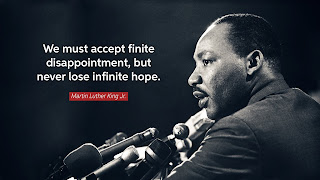Advent 3: Never Lose Hope
In last week's gospel reading, John the Baptizer was in the wilderness, proclaiming the coming kingdom with confidence. This week, we return to John, a different John, a John who is now imprisoned - and full of doubt.
In Matthew's gospel, it's pretty clear who Jesus is. Matthew uses subtle, as well as not-so-subtle, clues to connect Jesus to Moses, to the Law, and to the prophecies about the long-awaited Messiah. But not everyone can see it. Even John, the new Elijah, the one who has come to prepare the way for the Messiah, starts to have doubts.
So, why is John doubting?
The obvious answer is that he's in prison. And, sure, his individual circumstances could have definitely caused him to doubt. But it's not just that.
John is a direct descendant of the Hebrew prophets. And the message of the prophets is about the whole community, a national renewal, if you will. But John doesn't see that happening. John doubts because, as he sits in prison, he's hearing stories about Jesus that don't align with his expectations for the Messiah. And he's wondering if he bet on the wrong person.
That's something we can relate to. And in such times, we would do well to recall the words of Dr. King: "We must accept finite disappointment, but never lose infinite hope."
This is what Advent is all about: Living in the in between time, where we face finite disappointments on a regular basis, but also where we have infinite hope, for we can already see the light, symbolized by the candles on the Advent wreath, breaking through the darkness.
Our charge during Advent is to live into the light, to reflect the light and be the light, and to bring the light into the world.
But, for the moment, John could not see the light. And that's okay, for sometimes we depend on others to show us the light and to be the light for us. So he sends his followers to Jesus to ask if he's the one - or if they should look for another.
Jesus's response is beautiful. He deflects the question away from himself and instead points to the the tangible outcomes of his ministry: the blind who can now see, the lame who can walk, the lepers who are cleansed, the deaf who can hear, the dead who are raised, and the poor who receive good news.
In other words, Jesus says that questions about the Messiah are distractions because the Jubilee - THE JUBILEE - is here!
It's hard to see the Jubilee today. The kingdom is not here, not yet.
But, at the same time, it is. Each time two or three are gathered, each time we take care of one another - whether with a text or a phone call to check in, or a visit, or a much-needed meal delivered, or a Kroger card dropped in the mailbox at just the right time, or a friend sitting with your kids while you do some last-minute Christmas shopping - in all this and more, we see evidence of it.
Darkness is the absence of light. And it's easy to think we live in a world of darkness. But for those who have eyes to see, those who have been trained to see, there is by no means an absence of light. We must not, therefore, lose infinite hope.

No comments:
Post a Comment